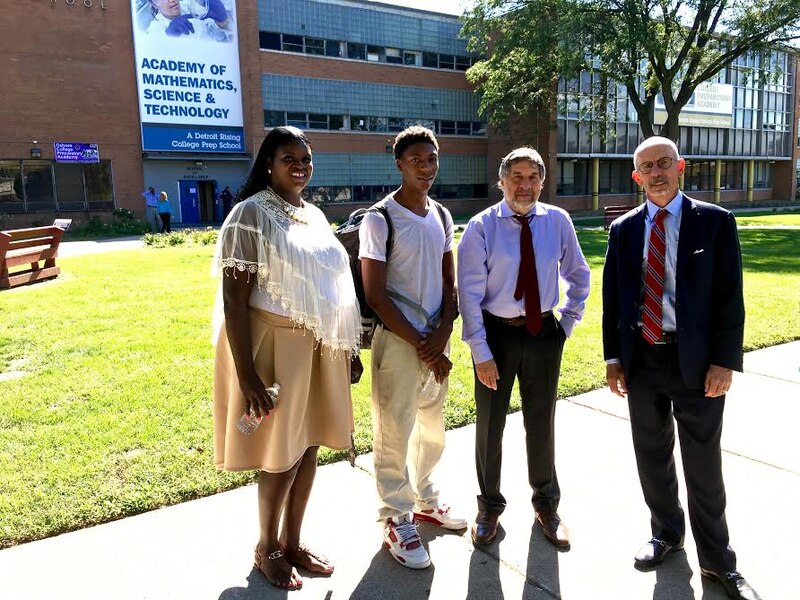Helen Moore was among the most visible champions of the Detroit literacy lawsuit. The veteran education activist says she was also a skeptic.
“We were doubtful from the beginning,” she recalled. “When it came out we celebrated but most of us who’ve been in the civil rights movement a long time knew that our foot was just in the door.”
Her apprehensions proved prescient. Just a few weeks after a federal panel ruled that there is a constitutional right to read — a precedent long sought by education activists like Moore — judges on the Sixth Circuit Court of Appeals voted to review the case, destroying the legal precedent that Moore and other advocates had cheered just weeks earlier.
That decision was perhaps the final big twist in a four-year, roller-coaster legal fight that sought to reshape the national legal landscape and win resources for Detroit schools.
The payoff for students wasn’t nothing, but it was far less than many advocates had wanted. The city school district will get some additional resources under a settlement reached last week with Gov. Gretchen Whitmer. A constitutional right to education, however, is still a distant hope for education advocates who see it as a tool to eliminate educational inequities in the U.S.
‘Very important news’
Late on May 13, Jamarria Hall’s phone buzzed with a text from the other side of the country.
“Call me first thing in the morning,” Mark Rosenbaum, the California-based attorney leading the lawsuit, wrote. “Very important news.”
“I’m still up,” wrote Hall, one of seven Detroit students who brought the lawsuit. It was 11:49 p.m., well after his usual bedtime, but he was keyed up from serving as the public face of a campaign to pressure Gov. Gretchen Whitmer into settling the case.
Rosenbaum told him over the phone that the case was over. Whitmer had agreed to a settlement that included $2.7 million for the Detroit Public Schools Community District, plus a promise that she would pursue another $94 million in the state legislature.
Hall, Rosenbaum, and others involved in the case knew that a far greater investment would be needed to transform the district’s fourth-grade reading scores, which are worse than those of any other big city in the U.S. They knew the settlement would hardly put a dent in the problems named in the lawsuit — the leaking school roofs and outdated heating and A/C systems that will cost up to an estimated $1 billion to fix.
Still, the deal represented a win for the city’s school district, which could easily have received nothing at all from the lawsuit, which was filed in 2016.
And a settlement was far from guaranteed in the face of an economic crisis and the GOP-led state legislature’s resistance to major new education spending.
“I didn’t know we were going to have a settlement until it was settled,” said Bruce Miller, a Michigan-based lawyer who was involved in the case on behalf of the plaintiffs.
‘The biggest obstacle was reality’
Three weeks earlier, on April 23, a panel of three federal judges in the Sixth Circuit Court ruled 2-1 that terrible conditions in Detroit had denied students their constitutional right to literacy. A federal court had never recognized such a right before.
The ruling launched a race to a settlement.
“Within a matter of hours if not minutes, we were putting together a plan,” said Eli Savit, an attorney for the city of Detroit who filed a brief in the case. “Everybody was doing other things. The world didn’t stop. But we were constantly working on this.”
Negotiators believed from the start that they stood a good chance of coming to terms with Whitmer. As a candidate, she’d spoken in favor of the student plaintiffs. And while she had chosen to continue the state’s defense after her election — a “betrayal” in Hall’s eyes — the state’s lawyers had refrained from arguing that a constitutional right to literacy does not exist.
Several lawyers were also encouraged that Whitmer, a registered attorney, was personally involved in the negotiations at times.
“She doesn’t have a lot of free time, let’s put it that way,” said Evan Caminker, one of the lead negotiators on the students’ legal team and a professor at the University of Michigan law school.
As Whitmer spent her days working to coordinate Michigan’s response to the pandemic and deal with protesters, lawyers began putting in long hours in virtual meetings, working out the foundation of a settlement.
It was slow going at first. The plaintiff’s team included some of the best lawyers in the country — at least five people involved in the talks had worked as law clerks for Supreme Court justices, but none had settled a case in the middle of a pandemic. At one point, Caminker’s daughter caused a stir by walking into his office with one of the family’s pet rats on her shoulder while he was in a video conference.
“We were in 12 different rooms all over the country,” Rosenbaum said. “Under normal circumstances this would have been resolved a lot faster.”

Some on the team felt they needed to move quickly. On May 7, the Republican-led state legislature had requested that the Sixth Circuit undertake a rare review of the case, calling the notion of a right to read an error of “grave and exceptional public importance.” The legislators argued that Michigan had protected the school system from “local mismanagement” by installing state-appointed emergency managers and ultimately agreeing to pay off some of the district’s debts.
To Caminker, May 14 was the best target date. After that, the Sixth Circuit could overturn the case, giving Whitmer less incentive to settle.
Negotiators put in long hours — “18, 19, 20-hour days,” by Rosenbaum’s count — to figure out what the settlement should contain. Their first challenge: Everyone on the students’ side of the case believed that a major investment in Michigan’s schools was the best way to ensure that all students learned to read, but that seemed out of the question. Any major new spending would have to be approved by the legislature in a state where school funding has stagnated for decades.
And with Michigan’s economy at a standstill due to the coronavirus and state coffers hemorrhaging money, any major spending seemed even less likely.
“The biggest obstacle was reality,” said David Hecker, president of the Michigan chapter of the American Federation of Teachers, who worked with the students’ lawyers on the settlement. “Would this state legislature vote to provide a bunch more money to Detroit?”
Fashioning the settlement: Do-nows and do-laters
As negotiations began, Detroiters were watching the case closely — but from the outside. Six months earlier, 200 Detroiters got up at 3 a.m. to be on hand at the federal courthouse in Cincinnati for oral arguments in the case. Now local activists were worried that their voices would be excluded from the settlement.
“Right now it looks like it’s going to be all white men who don’t live in Detroit who are sitting in the room negotiating with the governor,” Angie Reyes, a long-time community organizer in southwest Detroit and the founder of the Detroit Hispanic Development Corporation, said on May 5.
As activists pressured Whitmer to settle through a text message campaign, Reyes reached out to Hecker to ask if he’d help community representatives get a seat at the table.
The students’ lawyers agreed. In the end, representatives from numerous community groups participated, including advocacy groups 482Forward and the Brightmoor Alliance, the city of Detroit, the Detroit school district, and the Skillman Foundation, which had put up $150,000 to start the lawsuit in 2016. (Skillman is a Chalkbeat funder.)
Many of the Detroiters at the table — including Reyes, Larry Simmons of the Brightmoor Alliance, and Skillman CEO Tonya Allen — had worked together previously as members of the Coalition for Detroit Schoolchildren, a community group that published proposals for improving Detroit’s schools in 2015 and 2017.
They argued that the settlement should give Detroiters more voice in state education policy. The settlement ultimately created Detroit-based advisory groups that would influence the way any settlement funds were distributed and advise Whitmer on education policy.
With just a couple of days to go before Caminker’s preferred settlement date of May 13, attorneys worked feverishly to double check the legal ins and outs of the settlement that was taking shape.
“I haven’t shaved in probably four days,” Caminker said after the settlement was announced. “I’ve had a lot of jobs in my life, and many of them have forced me to work around the clock, so that’s not new to me, but I usually find time to shave.”
Late in the evening on May 13, the settlement was finished. It had two parts: do-nows, and do-laters.
Whitmer had agreed to introduce legislation — and reintroduce it for as long as she was governor — that would send $94.4 million to the Detroit district for literacy programs.
She also would immediately lift restrictions on the district’s power to raise badly needed funds from local taxpayers, create a Detroit panel that would advise her on education policy, pay $2.7 million to the district immediately for literacy programs, and send $280,000 to the seven student plaintiffs to continue their secondary educations.
‘The fight will continue’
As news of the settlement went public just after midnight, the people involved in the case could finally take a breath.
Many had hoped to get more for Detroit students. But with the right-to-read precedent still standing, the settlement seemed to cement an important legal milestone. Allen called it “a quiet pivot to a new era.”
“After we had our last phone call just before midnight, and officially signed the letter to the court, I couldn’t sleep,” Savit said. “You got a sense that something really historic was on the horizon.”
Still, lawyers involved in the case knew that the precedent was fragile.
After the settlement was announced, Carter Phillips, an attorney consulted with the students’ legal team, wondered openly if this was the end. “It’s not all tied up in a bow. You can’t ignore the risk that the court might rehear the case.”
He was right to worry: Days later, 16 judges on the Sixth Circuit court voted to review the case, nullifying the April 23 ruling opinion that the U.S. Constitution gives citizens the right to literacy.
The settlement wouldn’t be affected, but the long-sought right-to-read precedent was gone.
“We’re disappointed,” said Caminker. “We always knew that was a possible outcome. It was after all an important decision, in our view a landmark decision. No one can say they would be surprised that the whole court might say this is important enough to review.”
A faster settlement wouldn’t necessarily have prevented the court from overturning the right to read, he added.
In the meantime, federal courts in other parts of the country are hearing similar cases. And while the Detroit case has been formally vacated, the logic of that ruling could still influence judges in other courts, said Kimberly Robinson, a professor at the University of Virginia who has written in favor of a federal right to education.
“If the lawyers who litigated Brown v. Board took one defeat and said ‘We’re going home to cry in our milk’ — no,” she said. “The fight will continue. You shouldn’t overstate this case.”






